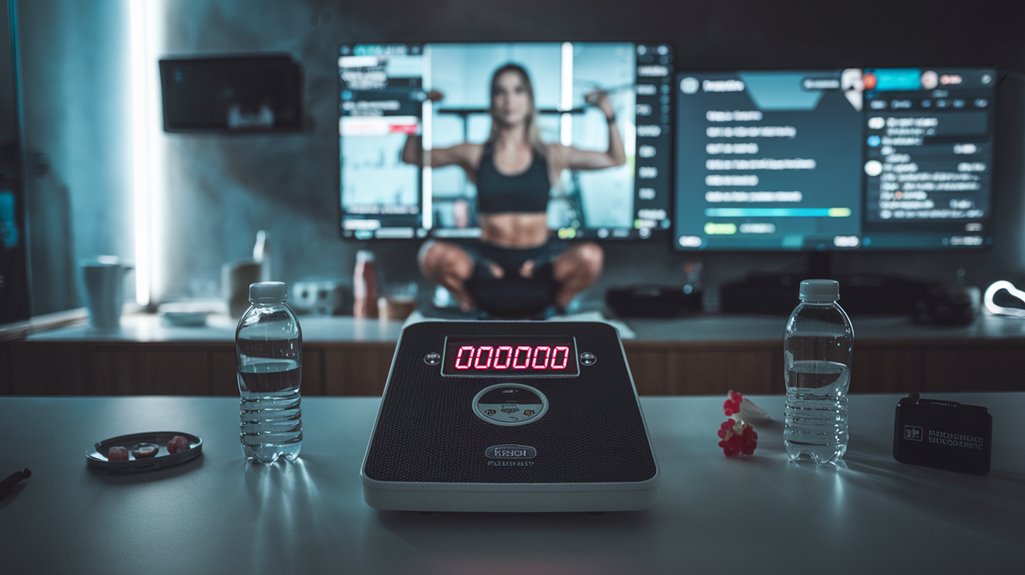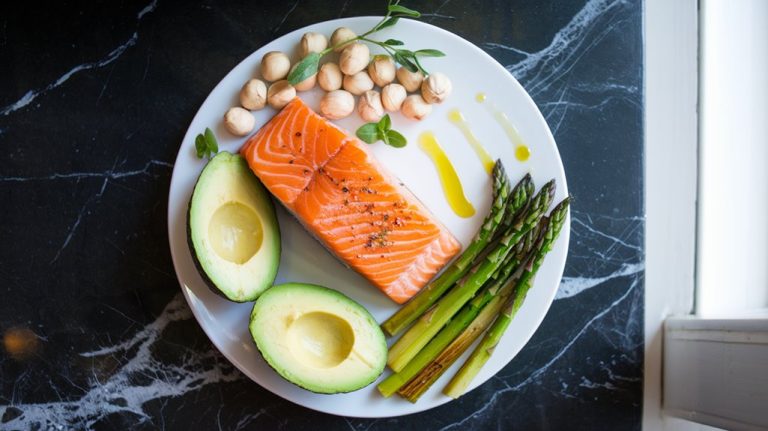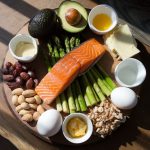While keto live streams offer 24/7 community support and real-time progress tracking, you'll need to approach dramatic transformation claims with skepticism. Clinical studies show ketogenic diets typically produce 10-13% weight loss within 8 weeks, not overnight miracles. You can benefit from live streaming's accountability features, but watch for red flags like promises of effortless results or extreme calorie restrictions. Understanding the science behind ketogenic results will help you separate fact from fiction.
Keto Highlights
- Live-streamed keto weight loss claims require scrutiny, as the FTC identifies numerous false advertising claims in weight loss marketing.
- Daily weight fluctuations of 2-4 pounds make real-time fat loss demonstrations scientifically unreliable and potentially misleading.
- Clinical studies show legitimate keto diet results average 10-13% weight loss over 8 weeks, not immediate dramatic changes.
- Red flags include promises of rapid fat loss, targeted belly fat reduction, and guaranteed results without lifestyle changes.
- Live streaming can provide valuable community support and accountability, but should focus on sustainable lifestyle changes rather than miraculous transformations.
The Rise of Keto Live Streaming
As digital platforms evolve to meet specialized dietary needs, keto live streaming has emerged as a powerful medium for sharing real-time nutritional guidance and lifestyle support. You'll find dedicated channels across YouTube, Twitch, and TikTok, where keto experts broadcast everything from meal preparations to scientific discussions about ketosis.
The integration of live streaming features into established keto diet apps has transformed how you access nutritional information. Virtual conferences now connect you directly with leading ketogenic practitioners, while specialized platforms facilitate immediate interaction with certified nutritionists. You're no longer limited to static content – these platforms enable real-time problem-solving and personalized guidance. Through live Q&A sessions and interactive demonstrations, you can receive immediate feedback on your ketogenic journey while participating in a broader community of like-minded individuals.
Understanding Real-Time Weight Loss Claims
While live streams offer real-time weight loss inspiration, they can also perpetuate misleading claims that warrant careful scrutiny. You'll often encounter promises of dramatic weight loss without diet changes or claims of permanent results that simply aren't scientifically possible.
When you're watching these streams, remember that the FTC has identified seven common false weight loss claims in advertising. You can't achieve substantial weight loss through products alone, and results vary greatly among individuals due to metabolic differences. What works for one streamer won't necessarily work for you.
Be particularly skeptical of dramatic before-and-after transformations or claims lacking scientific citations. Instead, focus on streamers who emphasize sustainable lifestyle changes and acknowledge that healthy weight loss requires consistent effort over time.
Scientific Evidence Behind Ketogenic Results
When you follow a ketogenic diet correctly, clinical studies show it can lead to significant weight loss, averaging 10-13% of body weight within the first few months. Your body undergoes measurable metabolic changes as it shifts from using glucose to ketones for fuel, resulting in reduced insulin levels and increased fat oxidation. Research confirms these metabolic adaptations contribute to weight loss through multiple mechanisms, including appetite suppression and potentially increased energy expenditure.
Research-Backed Weight Loss Data
Scientific research consistently demonstrates the ketogenic diet's effectiveness for weight loss compared to traditional low-fat approaches. Studies show you'll likely lose more than twice as much weight on keto – one trial found participants dropped 15.2 pounds versus just 4.6 pounds on a low-fat diet over three months.
You can expect around 13% weight reduction within 8 weeks if you're obese, with 10% loss maintained at one year when shifting to a Mediterranean diet after 6 months of keto. The diet's success stems from multiple mechanisms: ketones may directly reduce hunger, while lower insulin levels decrease appetite-stimulating hormones. However, you should note that long-term adherence remains challenging, and benefits often diminish over time, with some experts questioning sustained effectiveness beyond the initial months.
Metabolic Changes During Ketosis
Through complex metabolic adaptations, your body shifts into ketosis once glucose stores become depleted. Your liver begins producing ketone bodies from fat, which can fuel up to 70% of your brain's energy needs. Blood ketone levels between 0.5-3.0 mmol/L indicate you've achieved nutritional ketosis.
Your metabolism undergoes significant changes: insulin levels drop, promoting fat breakdown, while increased mitochondrial biogenesis enhances cellular energy production. You'll experience improved insulin sensitivity and a protein-sparing effect that preserves muscle mass. Your resting energy expenditure may increase by 10-15%, and you'll develop greater metabolic flexibility between fuel sources.
Hormonal shifts include decreased ghrelin levels reducing appetite, increased adiponectin improving insulin sensitivity, and potential growth hormone elevation, all supporting your body's adaptation to fat-based metabolism.
Live Stream Success Stories Vs Reality
As keto diet live streams gain popularity on social media platforms, a stark contrast emerges between the inspiring success stories shared by content creators and the complex reality of sustainable weight loss.
While you'll witness dramatic transformations and compelling before-and-after comparisons in these streams, it's essential to grasp that initial rapid weight loss often reflects water weight rather than fat loss. The live format creates accountability and community support, but it can also incentivize creators to exaggerate results for views. You'll need to take into account that success isn't guaranteed, as individual responses vary notably.
Though live streaming offers benefits like real-time education and motivation, the lack of medical oversight and potential spread of misinformation raise valid concerns about promoting safe, sustainable weight loss practices.
Tracking Methods and Measurement Accuracy
Your daily scale weight can fluctuate 2-4 pounds due to hydration, carbohydrate storage, and meal timing, so you'll need multiple tracking methods for accurate progress assessment. Body composition tests like bioelectrical impedance scales and DXA scans provide more detailed insights into fat loss versus muscle changes, though their accuracy varies based on hydration status and testing conditions. Progress photos taken weekly in consistent lighting, poses, and clothing will give you clear visual evidence of physical changes that might not show up in other measurements.
Daily Weight Fluctuations Explained
While stepping on the scale each morning might seem straightforward, daily weight measurements can fluctuate considerably due to multiple physiological factors. Your body weight naturally shifts 2-3 kg throughout the day, influenced by various elements that aren't related to actual fat loss or gain.
To understand these fluctuations, consider these key factors that impact your daily weigh-ins:
- Water retention from high sodium intake or carbohydrate consumption
- Recent food and fluid consumption patterns
- Hormonal changes, particularly during menstrual cycles
- Exercise-induced fluid loss and muscle inflammation
To obtain meaningful data, you'll need to weigh yourself consistently at the same time each day, preferably first thing in the morning. Focus on weekly averages rather than daily numbers, as this provides a more accurate picture of true body composition changes.
Body Composition Testing Methods
Understanding daily weight fluctuations leads naturally to exploring more thorough methods of tracking body composition changes. You'll find several validated methods, each with distinct advantages and limitations.
| Method | Accuracy (% error) | Key Considerations |
|---|---|---|
| DEXA | 1-2% | Gold standard, expensive |
| Hydrostatic | 1.5-2.5% | Requires facility visit |
| Skinfold | 3-5% | Technician-dependent |
| BIA | 3.8-5% | Affected by hydration |
DEXA and hydrostatic weighing provide the most accurate measurements but require specialized equipment and facilities. Skinfold measurements offer a practical compromise between accuracy and accessibility when performed by trained technicians. BIA devices, while convenient for home use, can produce variable results based on hydration status, recent meals, and exercise timing. Your choice should balance accuracy requirements against practical constraints like cost and accessibility.
Progress Photo Best Practices
Progress photos and precise measurements provide quantifiable data for tracking body composition changes that scale weight alone cannot reveal. For scientific validity, maintain strict consistency in your photo-taking protocol, including timing, clothing, lighting, positioning, and background elements.
- Take weekly front/side/back photos in identical conditions during morning hours
- Measure key body circumferences using proper tape measure technique and tension
- Document measurements and photos in dedicated tracking apps with cloud backup
- Supplement visual data with detailed logs of diet, exercise, sleep, and NSVs
Your measurement approach must prioritize accuracy and reproducibility. Use snug but not compressed tape placement, record to the nearest 0.25 inch, and maintain identical anatomical reference points. This methodical documentation creates reliable data for analyzing body composition trends and validating intervention effectiveness.
Social Media's Impact on Keto Expectations
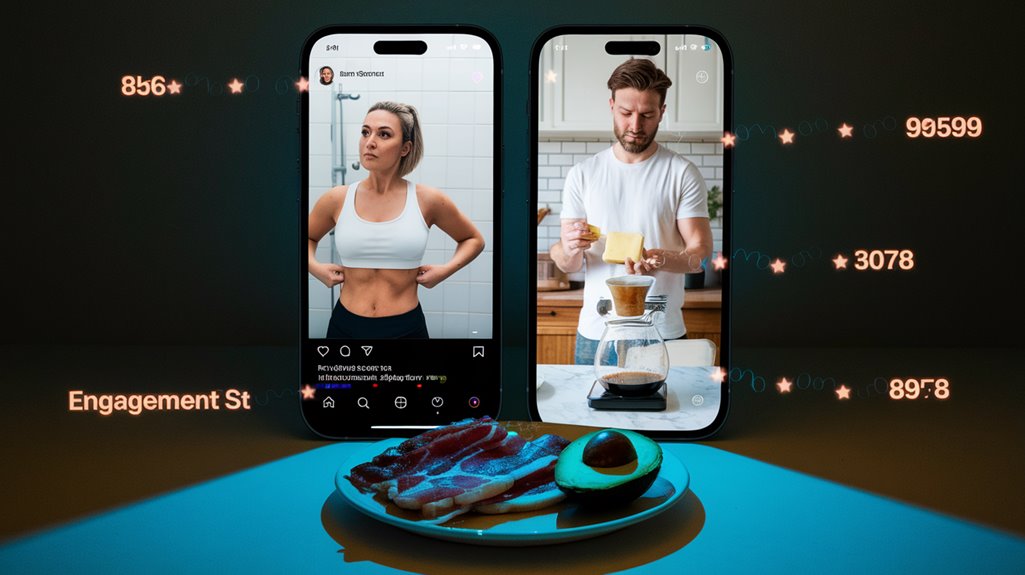
As social media platforms continue shaping public perception of the ketogenic diet, a complex web of influencer marketing, viral content, and user testimonials has created unrealistic expectations about keto success. You'll encounter millions of #keto posts showcasing dramatic transformations, yet many omit vital context about supplementary lifestyle factors or potential health risks.
The exponential growth in keto-related content – from Pinterest's 294% surge in searches to billions of TikTok views – has amplified both misinformation and unrealistic promises. You're likely to see photoshopped before-and-after images, cherry-picked studies without proper context, and unverified health claims that spread rapidly through echo chambers. While social media can provide keto inspiration, it is important to recognize that viral success stories often overshadow the complex reality of sustainable weight management.
Common Streaming Mistakes and Misconceptions
While many keto livestreamers share their dietary journeys online, common mistakes can undermine their success and mislead viewers. The real-time nature of streaming often reveals fundamental misunderstandings about ketogenic principles, particularly regarding macronutrient balance and supplement needs.
- You'll notice streamers overconsuming protein while neglecting vital fat ratios, potentially disrupting ketosis through gluconeogenesis
- Many fail to track total carbohydrates accurately, falling prey to hidden ingredients and misleading net carb calculations
- Live demonstrations often skip proper electrolyte supplementation, leading to symptoms viewers might misinterpret as keto flu
- Micronutrient deficiencies remain undiscussed in streams, with insufficient focus on essential vitamins, minerals, and omega-3s
Understanding these pitfalls can help you critically evaluate keto content and avoid common streaming misconceptions that could derail your progress.
The Psychology of Public Weight Loss
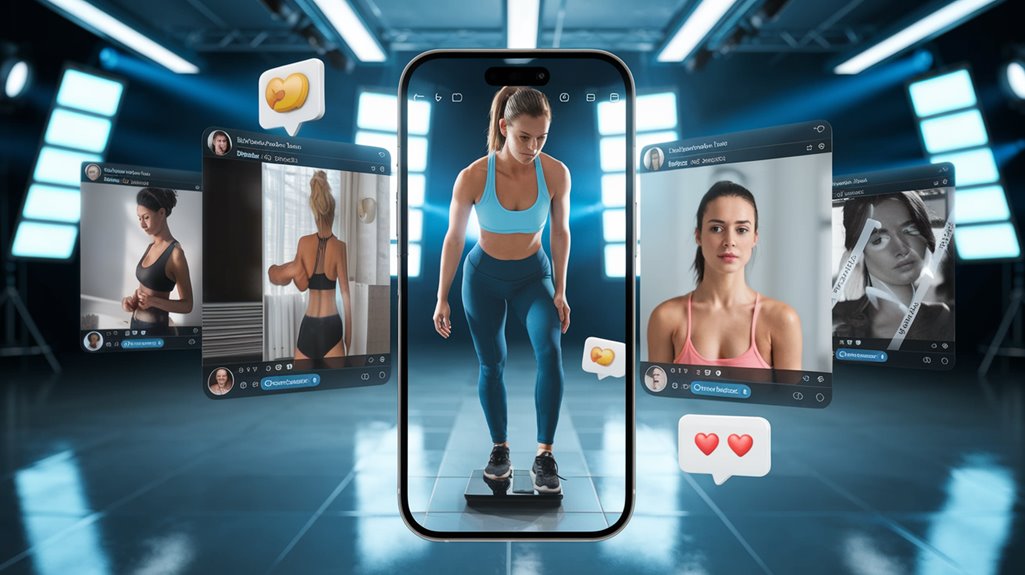
When you share your weight loss journey publicly through live streaming, you're tapping into powerful social accountability mechanisms that can boost your motivation and commitment to your goals. While public documentation of your progress can create external pressure to succeed, research shows that those who regularly self-monitor and receive social support tend to develop stronger healthy eating habits. Your success depends on maintaining a balanced perspective between seeking validation from your audience and focusing on evidence-based strategies that work for your individual circumstances.
Motivation Through Social Accountability
Research consistently demonstrates that making your weight loss journey public through social accountability can dramatically improve your chances of success. Studies show that having accountability partners increases weight loss success by 66%, while specific accountability appointments can raise your success rate to an impressive 95%.
- Regular check-ins maintain consistency when initial motivation wanes
- Online communities provide essential support and celebration of milestones
- Family and friend participation strengthens your commitment to goals
- Social connections influence health behaviors and lifestyle choices
The science behind social accountability is compelling – it leverages fundamental human social needs while providing external motivation for healthy choices. The Supportive Accountability Measure (SAM) confirms this with strong reliability (Cronbach α=.92), showing that technology-mediated treatments with greater support lead to better adherence in weight management programs.
Public Progress Creates Pressure
Despite the potential benefits of social accountability, making your weight loss journey public comes with significant psychological risks. Research shows that public weight loss attempts can increase your risk of internalized weight stigma by nearly 300% compared to those who maintain privacy, leading to depression and negative self-talk.
When you share your progress publicly, you'll likely face increased scrutiny of your eating habits and lifestyle choices. This heightened attention can trigger maladaptive behaviors, including binge eating and exercise avoidance. The "fat talk" phenomenon that often accompanies public weight loss intensifies body dissatisfaction and guilt. Studies indicate that exposure to such weight stigma doesn't motivate success – instead, it increases your risk of serious health complications and may contribute to disordered eating patterns.
Validation Seeking vs. Reality
The psychological drive to seek validation through public weight loss can create a precarious cycle of external dependency and emotional vulnerability. Research shows that while public accountability may initially boost motivation, it's often at the expense of sustainable, intrinsic drive. You're 67% more likely to maintain weight loss when motivated by internal factors rather than external validation.
Consider these critical factors affecting your weight loss psychology:
- External validation can mask underlying emotional issues requiring professional support
- Social media exposure may trigger unhealthy comparisons and extreme behaviors
- Sustainable results come from balanced internal and external motivations
- Non-scale victories prove more meaningful than public approval
You'll achieve better outcomes by focusing on health markers, practicing self-validation, and developing resilient habits that don't depend on others' recognition.
Red Flags in Keto Live Content
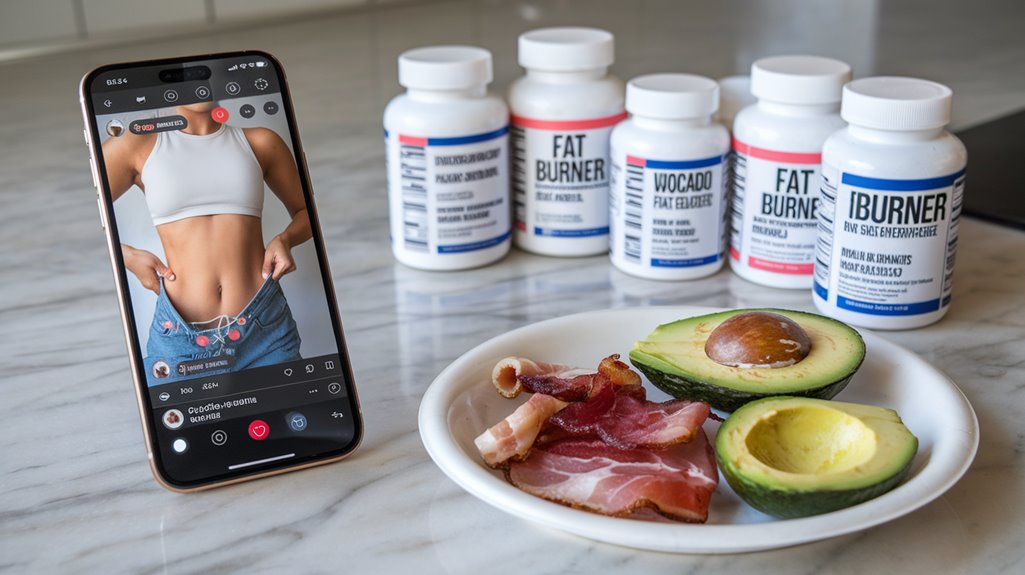
As keto diet content continues flooding social media platforms, identifying misleading information has become essential for protecting public health. When watching keto live streams, you'll need to watch for several warning signs: unrealistic promises of rapid fat loss, claims of targeted belly fat reduction, and guarantees of effortless results without lifestyle changes.
Be particularly wary of streams promoting extended fasting periods or extremely low calorie intake under 1200 calories daily. Watch out for hosts who dismiss scientific evidence while promoting "secret" weight loss methods or unregulated supplements. Many streams use manipulative tactics like limited-time offers and dramatic before/after photos. If you notice hosts targeting vulnerable groups or using cult-like language to pressure viewers, these are clear red flags that should make you question the content's legitimacy.
Verified Results Vs Marketing Hype
While marketing hype often promises overnight transformations, verified keto diet results paint a more nuanced picture backed by clinical research. Studies consistently show that ketogenic diets outperform high-carb alternatives for weight loss, with participants losing up to 12.8 pounds compared to 4.2 pounds on traditional diets.
To separate fact from fiction in keto content, watch for these evidence-based indicators:
- Clinical studies showing 2.3x increased fat burning during exercise
- Documented metabolic improvements, including 44% lower triglycerides
- Before/after photos with consistent lighting and angles
- Long-term results tracking beyond initial water weight loss
You'll typically see 2-10 pounds lost in the first week, primarily water weight, followed by steady fat loss when adhering to proper ketogenic protocols. These verified outcomes contrast sharply with unrealistic marketing promises of overnight success.
Expert Opinions on Streamed Weight Loss

Medical experts across multiple disciplines have raised significant concerns about livestreamed weight loss content, particularly regarding its potential to oversimplify complex health challenges. You'll find nutritionists warning about the dangers of extreme diets showcased in streams, which can lead to nutrient deficiencies and ignore vital long-term dietary behaviors.
Psychological experts point out that public weight loss displays can trigger eating disorders and exacerbate body image issues among viewers. Meanwhile, fitness professionals emphasize that the one-size-fits-all workout routines often featured in streams may increase injury risks. They stress the importance of personalized exercise plans for sustainable results.
These experts collectively advocate for evidence-based, individualized approaches to weight management under proper medical supervision, rather than following trending stream content that may compromise your health.
Ethical Considerations in Diet Broadcasting
When you broadcast diet-related content, you're ethically bound to verify health claims and provide evidence-based information that won't mislead or harm your audience. You'll need to take into account the vulnerability of viewers who might be struggling with eating disorders or body image issues, requiring clear trigger warnings and readily available support resources. Your responsibility extends beyond entertainment value to guarantee transparency about sponsored content, realistic expectations for results, and the promotion of sustainable, medically-sound approaches to weight management.
Responsibility in Health Claims
As health and wellness content creators reach ever-larger audiences through live streaming platforms, they must uphold strict ethical standards regarding their health claims. When broadcasting keto-related content, you're legally and ethically obligated to present evidence-based information while avoiding exaggerated results or misleading promises about weight loss.
- Disclose any sponsorships, affiliate relationships, or financial interests that could influence your content
- Present balanced information about both benefits and potential risks of ketogenic diets
- Include clear disclaimers that results may vary and consult healthcare providers
- Support claims with peer-reviewed research and clinical studies
Your responsibility extends beyond legal compliance – you're shaping public health perceptions and influencing dietary behaviors. Transparent reporting of methods, realistic timeframes, and acknowledgment of limitations are essential for maintaining credibility and protecting vulnerable viewers from potential harm.
Viewer Vulnerability Concerns
Live streaming diet content raises serious ethical concerns about viewer vulnerability, particularly regarding psychological impacts and eating disorder risks. Before/after images and constant weight loss messaging can trigger body image issues and anxiety, especially in those already struggling with disordered eating patterns.
You'll need to take into account that children and adolescents are especially susceptible to harm from diet-focused content due to their cognitive immaturity and developing self-image. The lack of proper risk assessments and informed consent in many live streams compounds these concerns. Without clear distinctions between entertainment and medical advice, viewers may develop unrealistic expectations or engage in dangerous dietary practices.
To protect vulnerable audiences, streams must provide educational resources, avoid sensationalized claims, and include appropriate content warnings about potential psychological impacts.
Balancing Entertainment With Truth
The dual imperative of entertaining viewers while maintaining truthful content presents a complex challenge for diet-focused broadcasters. Live streaming platforms must strike a delicate balance between engaging content and scientific accuracy when showcasing keto diet results.
Evidence-based practices for responsible diet broadcasting include:
- Incorporating qualified health experts to validate medical claims
- Using clear disclaimers about individual results varying
- Maintaining transparency about editing and methodology
- Documenting both successes and setbacks in the weight loss journey
While dramatic transformations attract viewers, broadcasters must prioritize accurate health information over sensationalism. This includes providing context for before/after comparisons, disclosing any financial interests, and ensuring content doesn't target vulnerable populations. By combining entertainment value with factual nutrition education, streams can engage audiences while promoting responsible health practices.
Long-Term Success Rate Analysis
While ketogenic diets demonstrate impressive short-term weight loss results, research reveals concerning long-term health implications that warrant careful consideration. You'll face markedly increased mortality risks, with a 32% higher all-cause death rate and a 51% increase in heart disease-related deaths.
| Health Metric | Low-Carb Impact | Research Finding |
|---|---|---|
| All-Cause Mortality | +32% | Higher death rate |
| Heart Disease | +51% | Increased fatality |
| Cancer Risk | +35% | Higher mortality |
| Type 2 Diabetes | +37% | Increased risk |
Your body also experiences metabolic disadvantages on keto, burning just 53g of fat daily compared to 89g on low-fat diets. Athletes should note that CrossFit participants showed up to 8% muscle loss in their legs, potentially compromising both endurance and strength performance.
Community Support and Accountability

Despite potential health concerns, successful keto adherence often depends on robust community support systems. Research shows accountability partnerships increase diet compliance by 65%, while digital platforms facilitate 24/7 encouragement and real-time problem-solving.
Modern technologies enable extensive support through:
- Live streaming platforms where viewers receive immediate feedback and celebrate milestones collectively
- Integrated tracking apps like MyFitnessPal and Carb Manager that sync with fitness devices for data-driven accountability
- Virtual communities on Facebook and Reddit, connecting over 2.5M members globally
- Buddy systems with scheduled check-ins and shared goal-setting for enhanced motivation
These digital support mechanisms create measurable improvements in adherence rates, particularly through shared experiences, mutual accountability, and continuous access to expert guidance and peer encouragement.
Future of Keto Live Stream Monitoring
As technological innovations rapidly transform health monitoring, keto live streaming platforms are integrating sophisticated biometric tracking capabilities that facilitate real-time metabolic insights. You'll soon see continuous glucose and ketone monitoring systems seamlessly integrated into live streams, allowing viewers to track streamers' metabolic states in real-time.
AI-powered analytics will predict your personalized responses to ketogenic interventions, while machine learning algorithms will optimize your macro ratios based on continuous biometric data. Remote patient monitoring capabilities will enable healthcare providers to make data-driven decisions about your treatment plan through secure APIs. The integration of blockchain technology will guarantee your health data remains secure while allowing selective sharing within virtual competitions and social networks.
Frequently Asked Questions
How Do Keto Streamers Maintain Privacy While Sharing Intimate Health Details?
You'll protect your health privacy by using pseudonyms, selective data sharing, encryption tools, clear consent policies, and anonymization techniques while focusing on general trends rather than specific personal details during streams.
What Camera Equipment and Setup Do Successful Keto Streamers Use?
You'll need a quality DSLR or mirrorless camera with HDMI output, paired with proper lighting (ring light + key light), plus a professional USB microphone for crystal-clear streaming quality.
Can Streaming Keto Journey Affect Insurance Coverage or Employment Opportunities?
You'll need to carefully consider privacy risks, as streaming health data could impact both insurance rates and job prospects. Insurers may monitor wellness activities, while employers might view public health information.
Do Successful Keto Streamers Make Money From Their Weight Loss Content?
Like butterflies emerging from cocoons, you can monetize your keto journey through subscriptions, sponsorships, affiliate marketing, and digital products, potentially earning substantial income while sharing your transformation story.
How Do Streamers Handle Negative Comments About Their Physical Appearance?
You'll need to maintain clear community guidelines, use moderation tools, respond strategically to negativity, and foster supportive chat environments. Don't engage trolls directly; focus on building positive viewer interactions.
Conclusion
As you navigate the keto live-streaming landscape, you'll need to separate the wheat from the chaff in weight loss claims. While real-time tracking can provide valuable accountability, the scientific evidence shows that sustainable fat loss isn't a sprint but a carefully monitored marathon. Focus on verified clinical data and documented long-term outcomes rather than sensationalized streams, and guarantee your weight loss journey is grounded in metabolic science.
References
- https://tim.blog/2013/07/30/ketogenic-diet/
- https://maitrilibellule.com/the-experiment-day-262-move-it-and-lose-it-an-update-on-the-ketogenic-diet/
- https://www.kumc.edu/about/news/news-archive/keto-diet-research.html
- https://statmodeling.stat.columbia.edu/2024/07/17/bill-james-hangs-up-his-hat/
- https://www.artmuseumofsouthtexas.org/watch?v=zQXcg3O31mu
- https://www.henrikkarlsson.xyz/p/search-query
- https://www.youtube.com/watch?v=5v3thwM2vfM
- https://jimruttshow.blubrry.net/the-jim-rutt-show-transcripts/transcript-of-currents-075-michael-nielsen-on-metascience/
- https://renew.org/video/?vid=eI1jTESjqAi
- http://thestoragealchemist.com/blog/2010/03/emc-blogger
- https://www.castironketo.net/blog/keto-trends-and-innovations/
- https://www.influencer-hero.com/top-influencers/top-120-keto-diets-influencers-in-the-us
- https://pubmed.ncbi.nlm.nih.gov/39628567/
- https://ketoketo.co/blogs/articles/why-the-keto-diet-remains-relevant-for-2025
- https://pangeaketo.com
- https://journals.plos.org/plosone/article?id=10.1371/journal.pone.0293670
- https://www.youtube.com/watch?v=nms6w5ijCx0
- https://keto-mojo.com
- https://www.foodnavigator.com/Article/2025/01/10/keto-diet-growing-in-europe/
- https://www.youtube.com/c/GoKetowithCasey

